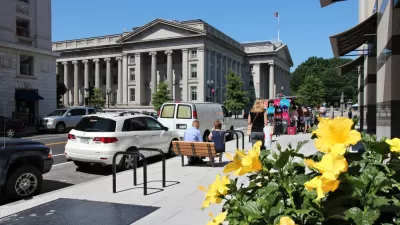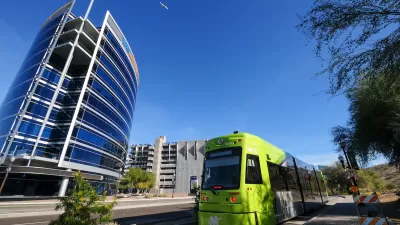The 'Coord' platform will give mobility companies a centralized place to access and use local data on parking, curb space, tolls, and the like.

Last year we saw Sidewalk Labs, the smart cities shop run by Google's parent company Alphabet, partner with the city of Toronto to plan for a new kind of digitally integrated neighborhood. Now, the venture has launched Coord, a cloud-based platform designed to serve as an "operating system" for urban mobility services.
"[Coord] will build the cloud-based platform to integrate the many mobility services that have sprung up around the world's cities in the past few years—bike-sharing, car-sharing, and ride-hailing—plus more traditional transportation options, like public transit," writes Aarian Marshall.
Software developers at mobility companies will be able, for a price, to access reams of local data often kept in separate silos. "For now, says [CEO Stephen] Smyth, Coord is dealing in data about infrastructure, not individuals."
The platform has the potential to improve how a variety of players utilize urban data.
"A bike-sharing company using Coord, for example, could see its service offered alongside other transportation options within a navigation app like Google Maps: A user could locate a bike, evaluate its cost against competitors', and buy a ride, all without breaking out a credit card. Or a toll agency working with Coord could push out info on dynamic toll prices, so a driver knows how much her trip will cost before she leaves the house."
FULL STORY: Alphabet's Sidewalk Labs Launches a Platform for Making the City of Tomorrow

Maui's Vacation Rental Debate Turns Ugly
Verbal attacks, misinformation campaigns and fistfights plague a high-stakes debate to convert thousands of vacation rentals into long-term housing.

Planetizen Federal Action Tracker
A weekly monitor of how Trump’s orders and actions are impacting planners and planning in America.

San Francisco Suspends Traffic Calming Amidst Record Deaths
Citing “a challenging fiscal landscape,” the city will cease the program on the heels of 42 traffic deaths, including 24 pedestrians.

Defunct Pittsburgh Power Plant to Become Residential Tower
A decommissioned steam heat plant will be redeveloped into almost 100 affordable housing units.

Trump Prompts Restructuring of Transportation Research Board in “Unprecedented Overreach”
The TRB has eliminated more than half of its committees including those focused on climate, equity, and cities.

Amtrak Rolls Out New Orleans to Alabama “Mardi Gras” Train
The new service will operate morning and evening departures between Mobile and New Orleans.
Urban Design for Planners 1: Software Tools
This six-course series explores essential urban design concepts using open source software and equips planners with the tools they need to participate fully in the urban design process.
Planning for Universal Design
Learn the tools for implementing Universal Design in planning regulations.
Heyer Gruel & Associates PA
JM Goldson LLC
Custer County Colorado
City of Camden Redevelopment Agency
City of Astoria
Transportation Research & Education Center (TREC) at Portland State University
Jefferson Parish Government
Camden Redevelopment Agency
City of Claremont





























